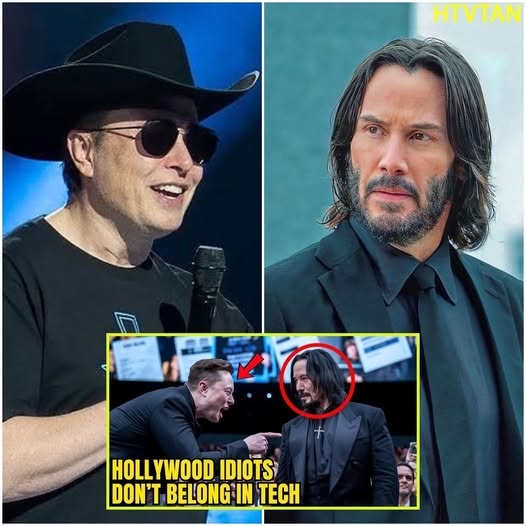
In a riveting live debate that captivated millions around the globe, the realms of cinema, philosophy, and technology converged in an unexpected yet intellectually stimulating dialogue between Keanu Reeves and Elon Musk. What began as a discourse on one of the most urgent issues of our era—the future of artificial intelligence, creativity, and human connection—swiftly transformed into an unforgettable encounter that left both the audience and the tech entrepreneur himself momentarily speechless. Keanu Reeves, renowned for his iconic roles in film and profound insights into human existence, engaged with Musk, the innovative founder of SpaceX and Tesla, in a conversation that would challenge preconceived notions about AI and creativity. Musk, a long-time advocate for technology as humanity’s savior, envisioned a future where machines could exceed human capabilities in creating art, music, and storytelling. However, it was Reeves’ composed and reflective reply that ultimately captured the audience’s attention and rendered Musk momentarily silent. The atmosphere between the two was charged from the outset. Musk, exuding his characteristic bold ambition, underscored the importance of technological progress in advancing humanity, particularly through AI. He elaborated on the prospects of Mars colonies and a future where artificial intelligence could address the world’s most significant challenges. In contrast, Reeves infused the dialogue with a different perspective. His remarks were thoughtful, rooted in a philosophical examination of technology, art, and human nature. He calmly articulated, “Perhaps our goal is not to control the world, but to understand it.” This juxtaposition—Musk’s emphasis on technological dominance versus Reeves’ focus on comprehension—set the foundation for a debate that transcended the mere future of AI. It evolved into a profound exploration of what it means to be human in an increasingly machine-driven world. The pivotal moment of the debate arose when Musk was queried about the potential for AI to surpass human creativity. His answer was unequivocal and assertive: “Sooner or later, AI will surpass human creativity.”The strength of this exchange stemmed not only from the confrontation between two titans from distinct domains but also from its wider societal implications. Musk’s ambitious and innovative vision for AI and technology often overlooks the human aspect of innovation—the personal relationships and emotional experiences that are essential for genuine creativity. In contrast, Reeves advocated for a more harmonious approach that acknowledges the significance of human experience in shaping the future. He reminded the audience that while technology can undoubtedly augment human abilities, it can never substitute the essence of creation. Reeves’ remarks act as a clarion call, urging us to reflect more profoundly on the role technology ought to play in our lives. Will we permit it to overshadow our humanity, or will we ensure that our hearts and minds remain central to innovation? The discourse between Musk and Reeves has ignited not merely a dialogue about AI but has also sparked a broader conversation regarding the future of creativity, human connection, and the equilibrium between technology and authenticity. In an era where technology is frequently perceived as the ultimate remedy for every challenge, Keanu Reeves has reminded us that certain elements—such as genuine creativity and emotional bonds—cannot be programmed or artificially generated. This debate transcends the future of AI; it concerns the type of future we aspire to create for ourselves. Do we wish to inhabit a world where machines dominate all aspects, or do we prefer a future where humans continue to lead with empathy, experience, and imagination? What are your thoughts on Keanu Reeves’ perspective regarding AI and creativity? Can machines genuinely exceed human creativity, or is there an irreplaceable quality to the human experience? We invite you to share your insights below and engage in the discussion!
